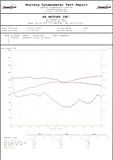Well let me tell you that the front page article at
www.autospeed.com called The Real Way Of Comparing Engine Designs was very interesting to say the least. Albeit a little hard to understand if you have limited knowledge of engines in general.
In general, the article mentions that you can compare engines, apples to apples, by calculating the BMEP. The BMEP is the effective (actual) pressure on the pistons. The higher the pressure, the better the engine (in general).
But what the Author fails to mention, is that if you compare the Effective Pressure (BMEP) and the static pressure, you can tell how good the engineers are at their jobs. If you get a BMEP higher than the static compression ratio, it is more than 100% efficient at filling the cylinder with air.
Here are the major sub-compact results:
1st gen Aveo: 9.6 (77kw @ 6000rpm, 1.6L, 9.5:1)
2nd gen Aveo: 9.5 (81kw @ 6400rpm 1.6L, 10.8:1)
2010 Yaris: 10.5 (79kw @ 6000rpm 1.5L, 10.5:1)
2010 Fit: 10.9 (89kw @ 6400rpm 1.5L, 10.4:1)
2010 Versa: 10 (80kw @ 6000rpm 1.6L, 9.8:1)
2010 Accent and Rio: 10.3 (82kw @ 6000rpm, 1.6L, 10:1)
Yep, you read right! The new Aveo engine is the only one that doesn't get 100% cylinder fill. But what does it mean? Unfortunately, the only thing I can think of is that the intake system isn't tuned for maximum cylinder fill at maximum power. So lets do the math:
At maximum torque, 142Nm @ 3800rpm, the engine makes 56.5kw. That gives us an 11.2 bar result. Meaning that the engine does get over 100% cylinder fill, just not at maximum power.
Lets look at the 1st gen Aveo: It gets 145Nm @ 3600rpm (54.7kw). You'd think it would do better than the 2nd gen. And it does. The result is 11.4. Now what?
Well it's easy to see that the new ECOTEC...is just plain... good marketing. In people's eyes, on paper, it looks better. Sure, makes more power. It's named after the famous Ecotec that saved the Cavalier. It uses more advanced technologies like variable valve timing. But in the end, the e-tec is simply better.
Well, I'm not sure what to think. The newer Aveo's get better gas mileage, but they also have better aerodynamics. Is the new engine really better on gas? I don't think so. I think if someone was to put one in a 1st gen body, we'd see bad results. Maybe they put more time on the fuel and ignition maps and the combination of better aerodynamics and software works together.
What do you guys think?



 LinkBack URL
LinkBack URL About LinkBacks
About LinkBacks
 Reply With Quote
Reply With Quote 2009 Chevrolet Aveo LT
2009 Chevrolet Aveo LT 2009 Chevrolet Aveo LT
2009 Chevrolet Aveo LT

